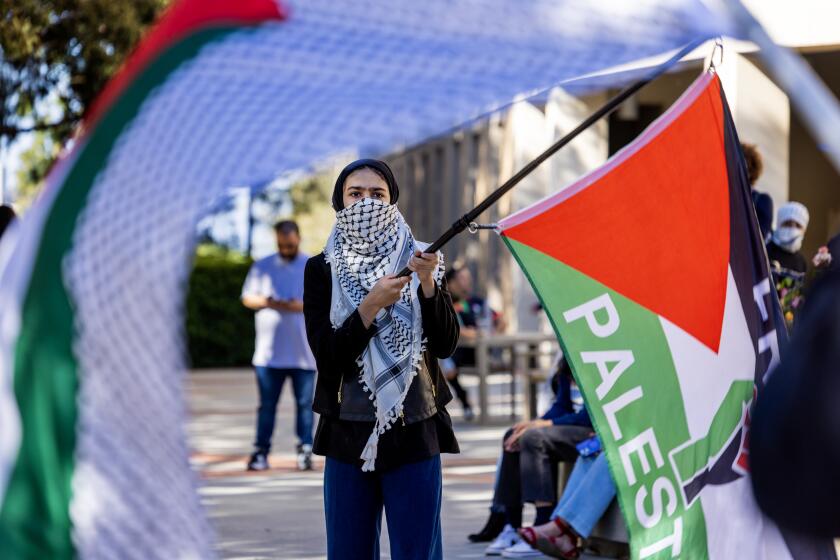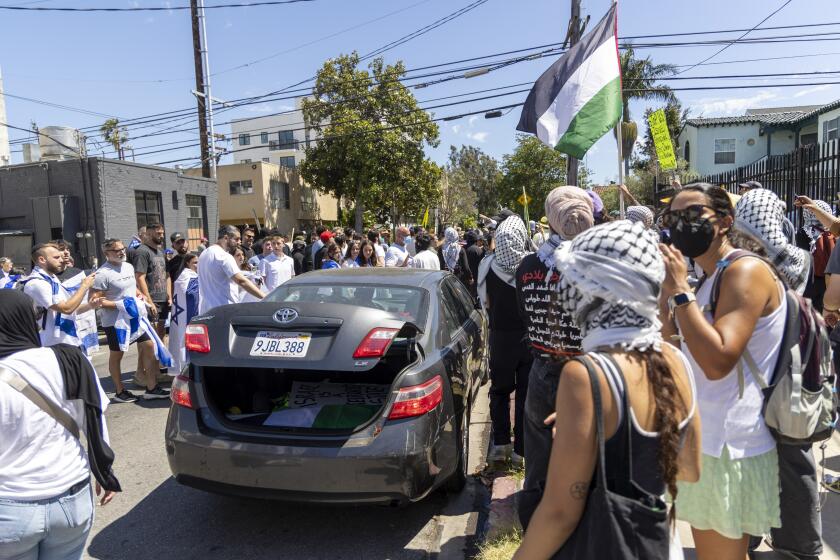
- Share via
CHICAGO — He walked down a side street, eyes darting here and there, wondering how it would unfold.
“What kind of fences will the police have? Will they bring dogs?” Hatem Abudayyeh asked. He stopped in the shadow of the United Center, home of the NBA’s Bulls and the NHL’s Blackhawks and a draw for tens of thousands of pro-Palestinian demonstrators who are expected to protest against U.S. support for Israel at the Democratic National Convention this month. “I hope they don’t militarize it,” he said. “The first statement the police made was about mass arrests. They’ve backed off a little. But they’re trying to intimidate us.”
The son of Palestinian immigrants, Abudayyeh is one of the march’s organizers and has long been at the center of civil rights protests. He was investigated by the FBI more than a decade ago — no charges were brought — and in 2017 he helped block traffic at Chicago O’Hare International Airport over then-President Trump’s Muslim travel ban. The demonstration he is preparing comes as this onetime city of stockyards and slaughterhouses hopes it can avoid the chaos and police brutality that marked the antiwar protests that engulfed the Democrats’ convention here in 1968.
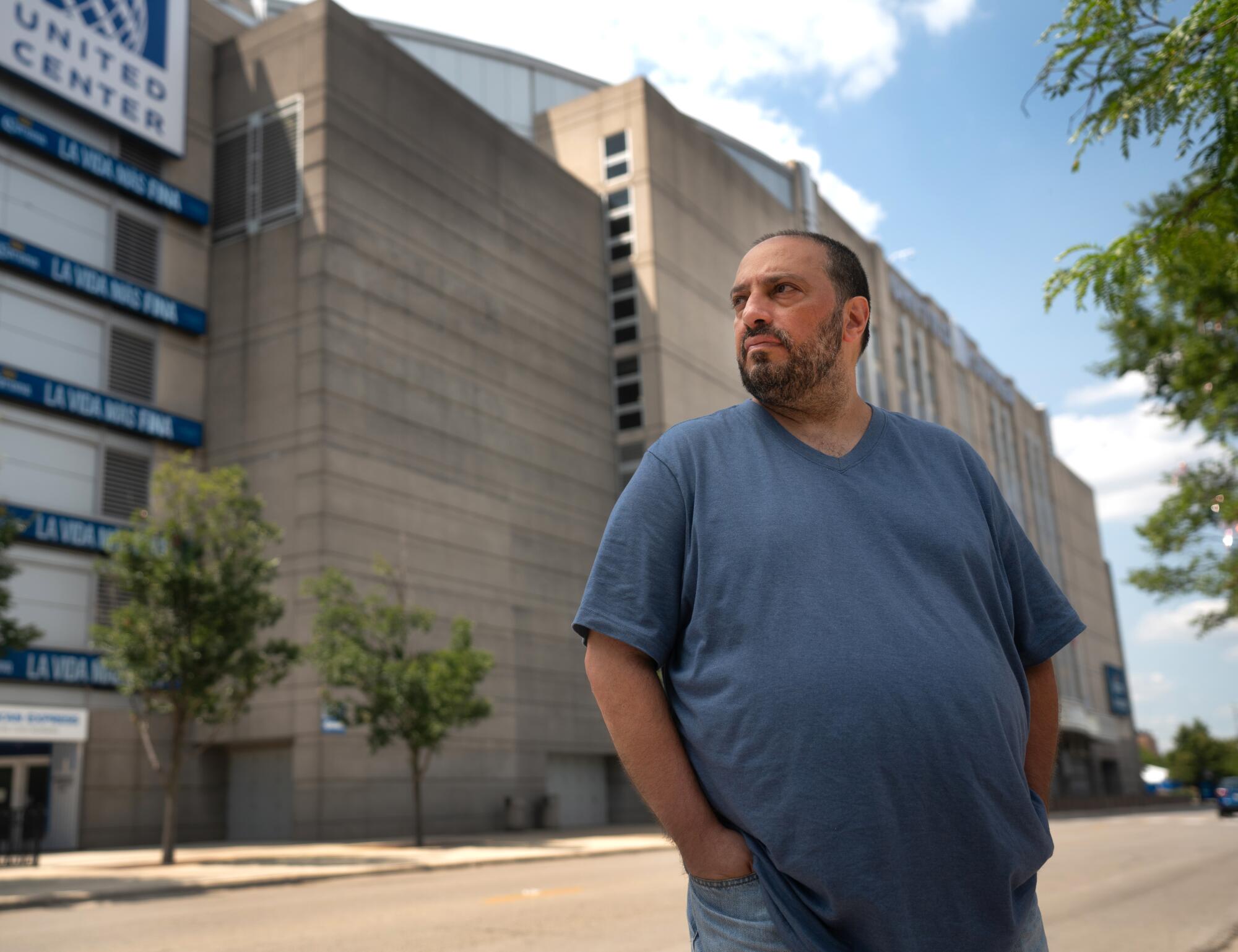
“Palestine is this generation’s Vietnam War,” Abudayyeh said, noting that more than 39,000 Palestinians, according to Gaza health authorities, have been killed by Israeli forces since Hamas attacked Israel in October. “We’re unabashed about the Palestinian right to self-defense to end Israeli genocide. We have momentum. I don’t think we’ll lose any steam with [President] Biden out of the race. Kamala Harris and other Democrats are still backing Israel.”
Tensions have escalated and arrests have been made as protesters continue to stake out areas on the campuses of many California universities, including UCLA, USC and Cal Poly Humboldt.
Abudayyeh’s parents emigrated from the Israeli-occupied West Bank village of Al Jib and settled on Chicago’s North Side in the 1960s. Both were activists and community leaders, who on Sundays drove their son to Arab neighborhoods on the South Side so he would know his lineage and learn that social change comes from sacrifice and solidarity. That lesson has kept him on the front lines of hundreds of demonstrations. But few as consequential as the national stage he and his compatriots from more than 150 organizations will find themselves on when an energized Democratic Party arrives here with the expectation of nominating Harris for president.
“I don’t feel there’s anything to lose,” said Abudayyeh, 53, a large man with glimmers of gray in his beard who calls himself an “anti-imperialist” and sounds at times like a provocateur from a long-ago newsreel. “We’ve already dealt with political repression. We know the feds are here and will be crawling up and down Chicagoland.”
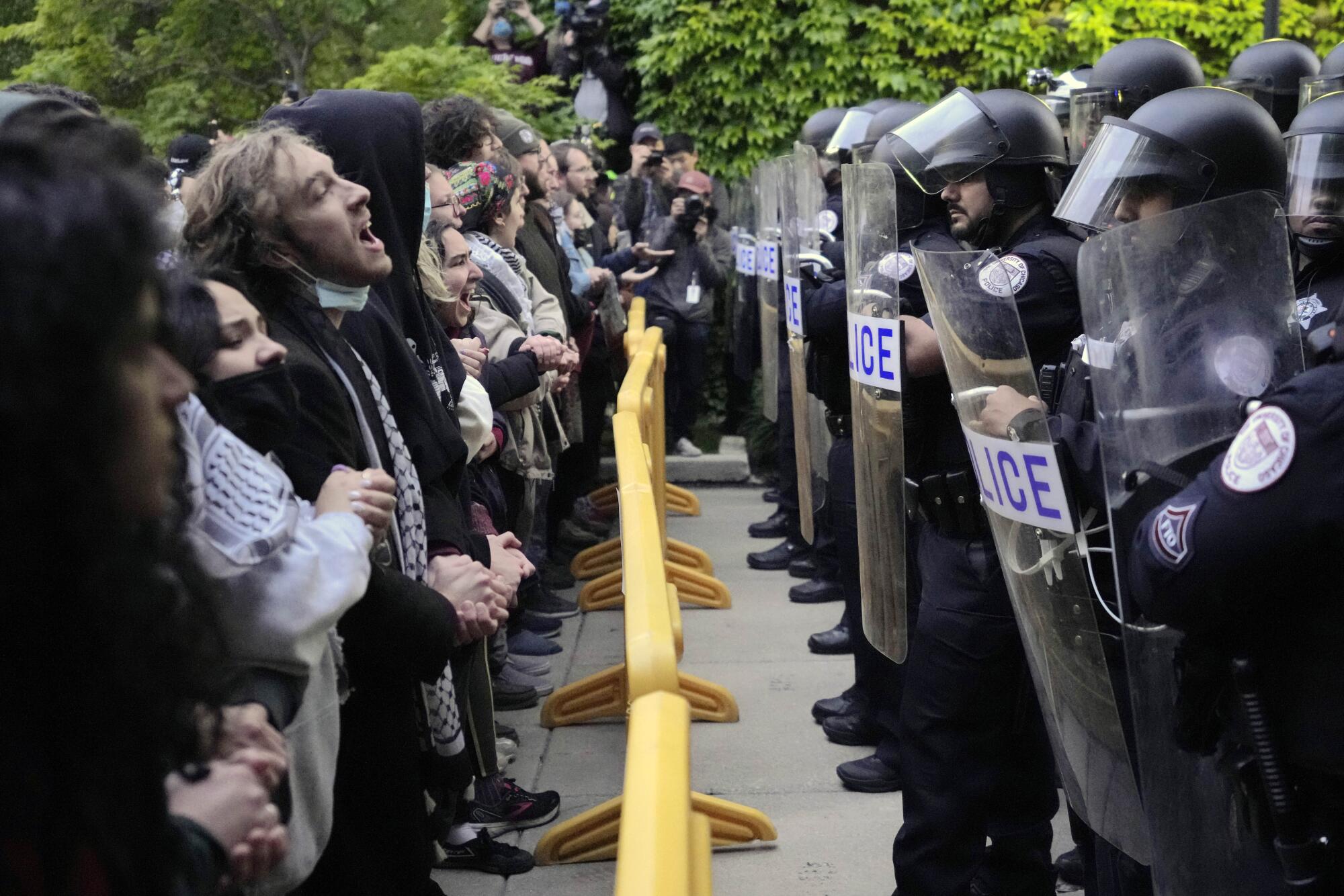
The Chicago Police Department has been training to de-escalate threats of unrest at the convention and is calling in hundreds of law enforcement officers from across the state for backup. The department — just weeks after a Fourth of July weekend that saw more than 100 shootings citywide — is under intensifying pressure over security after the assassination attempt on Trump at a Pennsylvania rally last month. This comes after a 2021 report by the city’s Office of Inspector General found the department was marred by confusion and intelligence failures during violence related to the George Floyd protests a year earlier.
The police will “not only allow everyone who comes here to express their 1st Amendment rights, but we will protect their rights while doing it,” department Supt. Larry Snelling told reporters recently. “What we will not tolerate is vandalism to our city. What we will not tolerate is violence.”
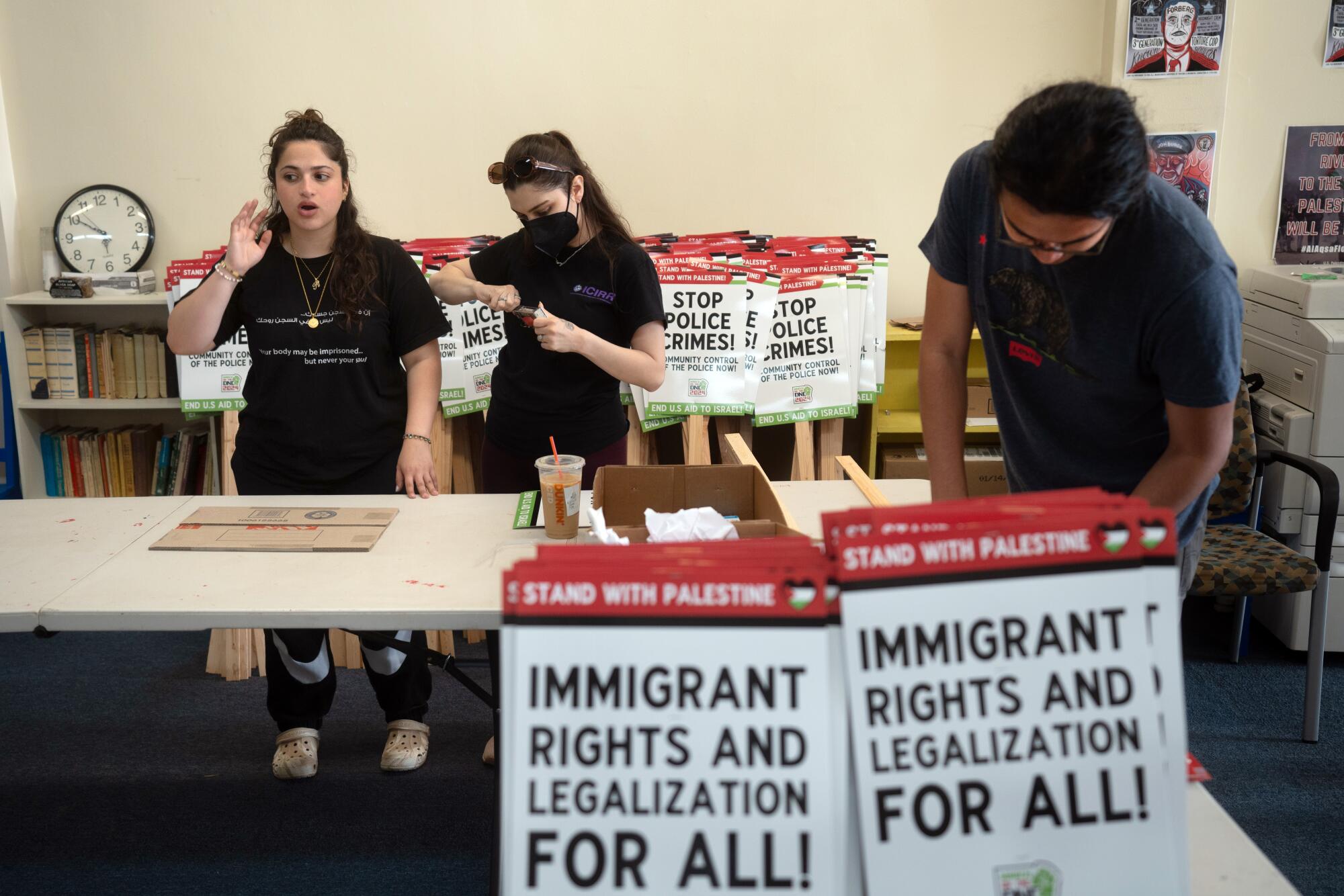
The overall goal of the protest — organizers have condemned the Democratic Party as being “a tool of billionaires and corporations” — is ending U.S. military aid to Israel and the creation of an independent Palestinian state. That same demand ignited demonstrations that shook college campuses in the spring. But the protesters in the March on the DNC 2024 come from many causes, including immigrant, reproductive and LGBTQ+ rights, anti-racist networks and those seeking to stop police repression in minority communities.
“We are in unconditional solidarity with the Palestine liberation movement,” said Frank Chapman, a mentor to Abudayyeh and field organizer and education director of the Chicago Alliance Against Racist and Political Repression. “Our political destinies are entwined. All those billions of dollars going to Israel could be used to build up America and reverse the injustices against Black Americans. You can’t have a war on poverty and at the same time perpetuate genocide overseas.”
The demonstrations over Israel’s war in Gaza are intense. But how deep and long-lasting is their staying power in U.S. politics?
Activists stapled together protest signs on a recent evening at the alliance’s South Side headquarters, where a picture of Malcolm X hung on the wall, and outside, not far from the L train, a man carried an open bottle in a crumpled bag and wandered beneath a sign for Living Hope Church and a lawyer’s billboard that read, “Call Top Dog.” The activists ranged in age from students to a gray-haired man; they moved swiftly and quietly stacking signs near the windows like a small army waiting to advance.
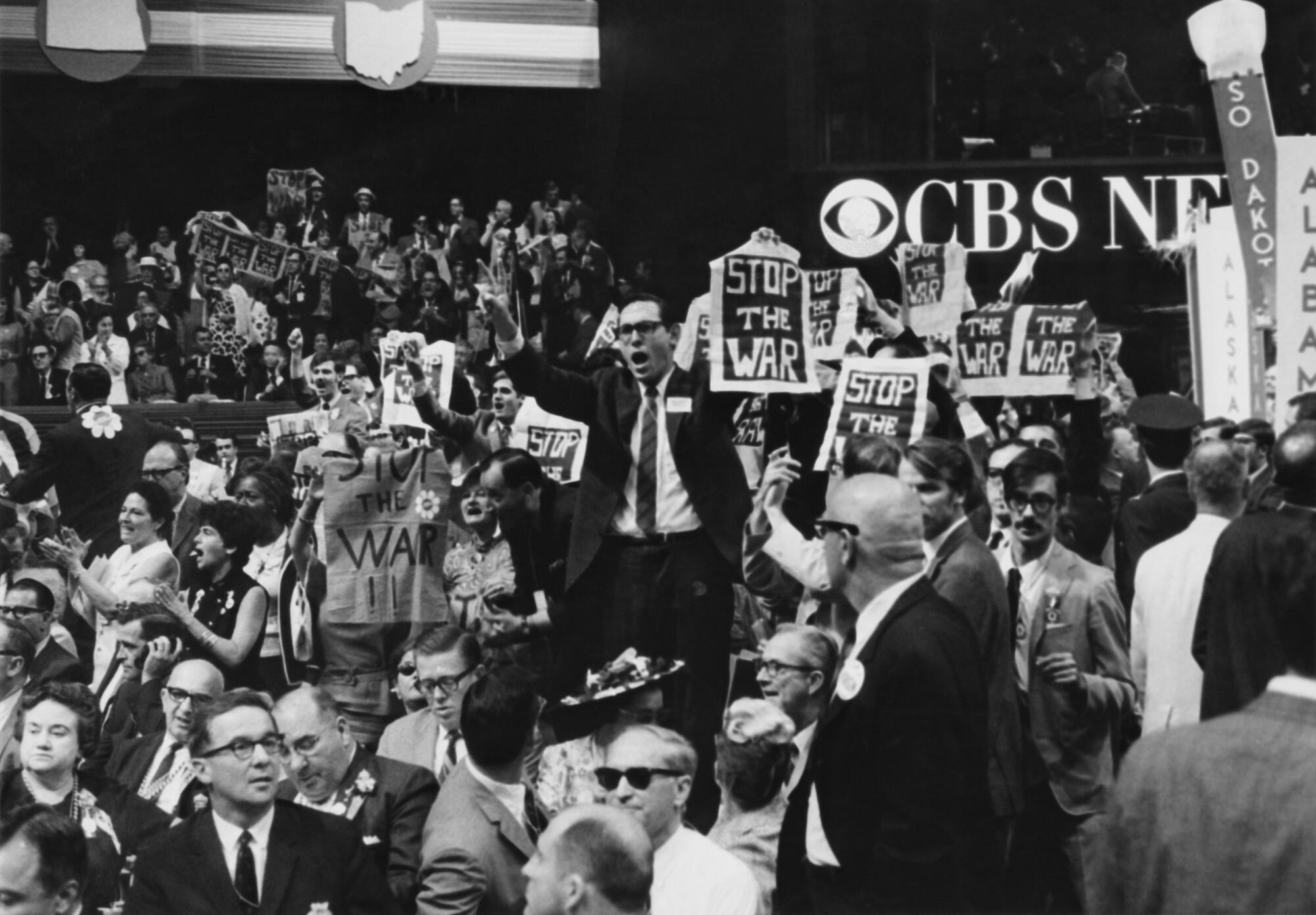
“It feels like we’re building something,” Adrian Gallegos, a computer science major at the University of Illinois Chicago, said next to rows of “Stop Police Crimes” signs. The air was sharp with the spirit of rebellion, as if one were listening to Jimi Hendrix while eavesdropping on the 1960s anti-establishment musings of Black Panther deputy chairman Fred Hampton or Yippie activist Abbie Hoffman.
“The system has been exploiting and oppressing people for 400 years,” said Kobi Guillory, co-chair of the Chicago alliance. “It’s inevitable it will crumble under the weight of its own contradictions.”
The 1968 peace movement “was a mostly white-led movement. This is not,” said Chapman, a revered figure in the city’s civil rights scene for half a century. “The struggle for peace today is more multi-ethnic and multi-international. It is broader and deeper than the antiwar movement around Vietnam. This will lead to a political realignment for people of color and working-class white people who want change.”
Abudayyeh sees similarities to and contrasts with 56 years ago. The 1968 convention followed Democrat incumbent Lyndon B. Johnson’s decision not to seek another term; this year Biden dropped out of the race. Then and now, the Democrats were divided over unpopular wars. But the Israel-Hamas war is different from the Vietnam War, which consumed the American imagination for years, killing more than 58,000 U.S. service members and an estimated 2 million to 3 million Vietnamese. Israel’s bombardment of the Gaza Strip is supported by U.S. military aid, but Washington has not declared war, and no American soldiers are dying.
What’s more, the politics of Chicago and the country are not the same as in 1968, when the nightly news echoed with reports of rioting and the assassinations of Robert F. Kennedy and the Rev. Martin Luther King Jr. Back then, Chicago Mayor Richard J. Daley, who was known as “the Boss,” ordered a clampdown on dissent, and police attacked protesters with billy clubs and tear gas, leaving hundreds arrested or injured. Current Mayor Brandon Johnson is a progressive and onetime union organizer who has supported activists and in June ordered a task force to study making reparations to Black residents.
A Jewish man filed a lawsuit against two pro-Palestinian groups over a June demonstration outside an L.A. synagogue that turned violent and drew condemnation.
The protests at this year’s convention will confront a troubled and distracted land. The assassination attempt against Trump, Biden’s departure, the rise of Harris and battles over abortion, inflation, book banning, housing prices and other issues have left many Americans inward-looking and dispirited about the future. But Abudayyeh said the injustices against Palestinians are visceral enough to force Democrats, including Harris, who has been more forceful than Biden in criticizing Israel for creating a “humanitarian catastrophe” in the Gaza Strip, to take notice of the marchers’ demands at the convention.
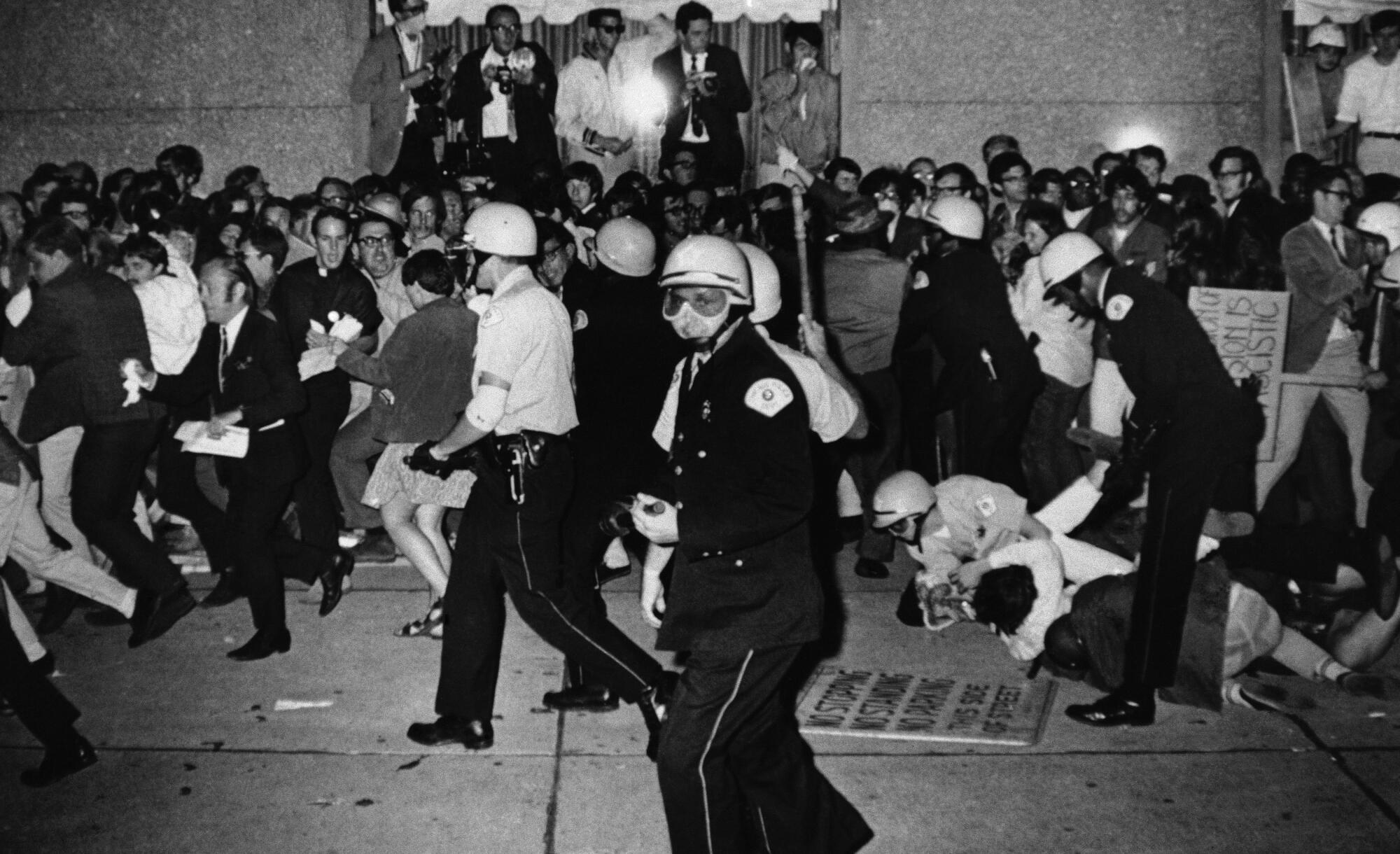
“Yes,” he said, “the timing is right.”
The other day, Abudayyeh, wearing a face mask after a bout with COVID-19, drove beyond his office at the Arab American Action Network, where he is executive director, to an Arab neighborhood of sweet shops, jewelry stores and beauty academies. The streets and swirling dialects connected him to Palestinians, like his deceased parents, who emigrated here after Middle East wars and Israel’s occupation of the West Bank.
“They always wanted to return home, but [Palestinians are] now an established presence in Chicago,” said Abudayyeh, who has a daughter, and is also national chair for the U.S. Palestinian Community Network. “It took my parents 25 years to buy a house and give up on the dream of going back.”
The conversation, as often with Abudayyeh, who seems to be in many places at once, turned in a new direction. Protest organizers, he said, have been in a months-long struggle with the city on a route that would allow demonstrators to march close to the United Center.
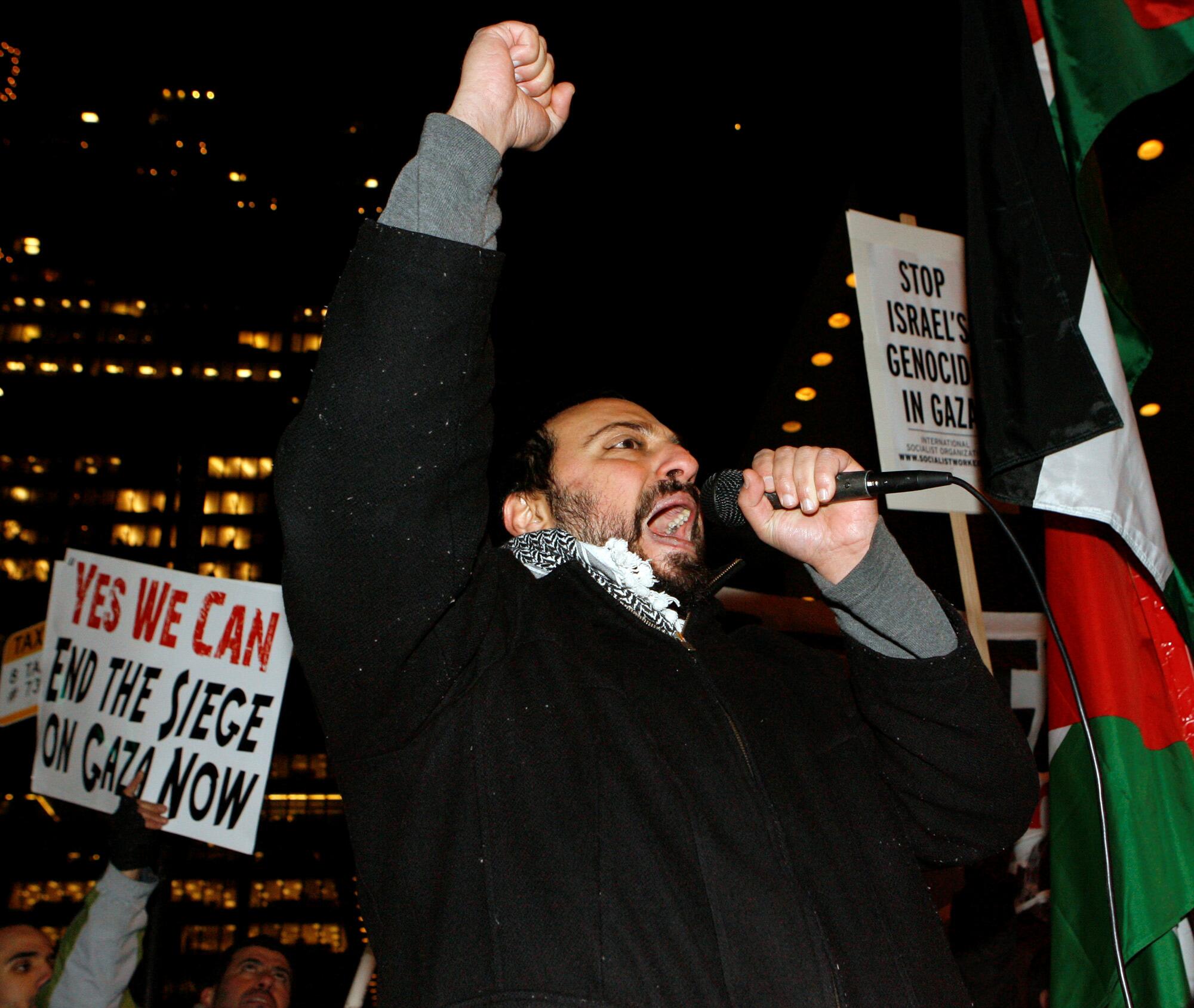
“We’re making progress,” he said. “When we first filed for a permit, the city wanted to keep us four miles away from the center.” The new plan allows protesters to gather at and march from Union Park, several blocks from the site. “We’re within sight and sound,” he said, “but they’re not giving us a long enough route to accommodate tens of thousands of people.”
Abudayyeh is accustomed to the reach of the state. Two years after working with antiwar activists at the 2008 Republican National Convention in St. Paul, Minn., the FBI raided his home, seizing computers, files, books and documents. His bank accounts were frozen. The sweep was part of an investigation into about two dozen activists in the Midwest suspected of supporting international terrorist organizations. Abudayyeh was targeted over helping arrange delegations to Gaza and the West Bank of activists opposed to Israeli occupation.
He said he had no connection to militant groups. Months earlier, he had been invited to the Eisenhower Executive Office Building, next to the West Wing of the White House, for an outreach meeting for Arab Americans. Activists and community leaders came to his defense. He refused to answer a grand jury subpoena, and more than two years later his confiscated materials were returned and no charges were filed.
“This is a massive escalation of the attacks on people that do Palestine support work in this country and antiwar work,” he said at the time. “We’re not going to stop speaking out against U.S. support of Israel’s violations of the Palestinian people.”
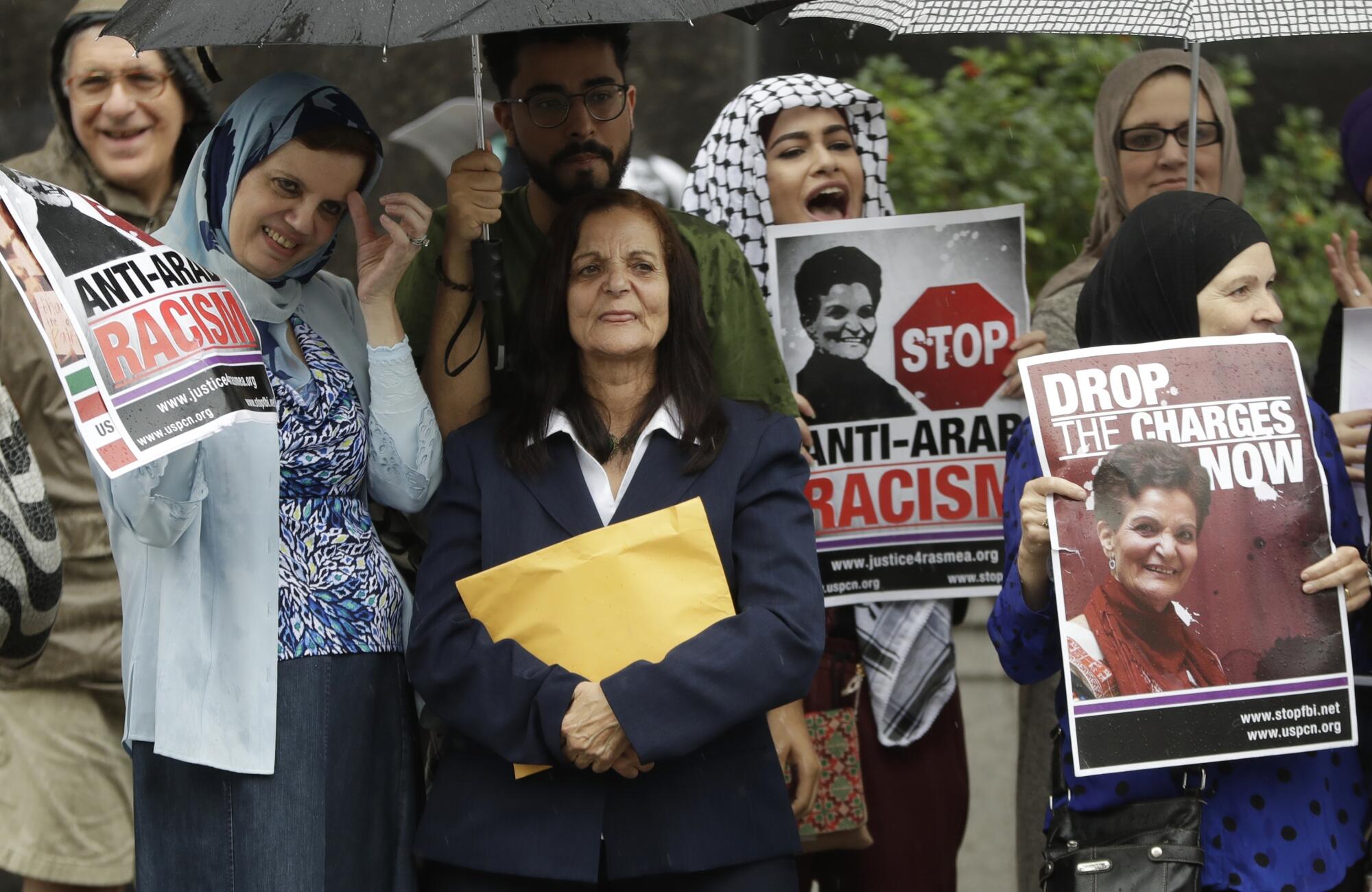
Abudayyeh’s statements and sentiments are often provocative in an age when some protesters against the Gaza war have been assailed as antisemitic or for espousing terrorism for their support of Hamas. He has called Hamas “a legitimate resistance force” and has said “the real terrorists are the governments and military forces of the U.S. and Israel.” When Iran retaliated against Israel with missiles and drones in April, Abudayyeh broke the news during an activist meeting, where a few in the crowd cheered.
In 2017, Abudayyeh coordinated the defense committee for Rasmea Odeh, a Palestinian activist imprisoned in Israel for her involvement in two bombings in Jerusalem in 1969. Odeh said she confessed after being tortured by the Israeli military. She was released in a prisoner swap a decade later and eventually moved to Chicago, where she was associate director of the Arab American Action Network. She became an American citizen but was deported after pleading guilty to not disclosing her criminal history to immigration officials.
Abudayyeh’s activism has been ingrained since childhood. His father, who worked for an insurance company, was a co-founder of the Arab Community Center, and his mother was Chicago chapter president for the Union of Palestinian Women’s Assns. He attended UCLA in the early 1990s, studying biology and English and hoping to join a progressive campus culture. Instead, he said, he found a mostly white and well-to-do population that was uninterested in activism, except for Latino students who taught him about the Chicano movement.
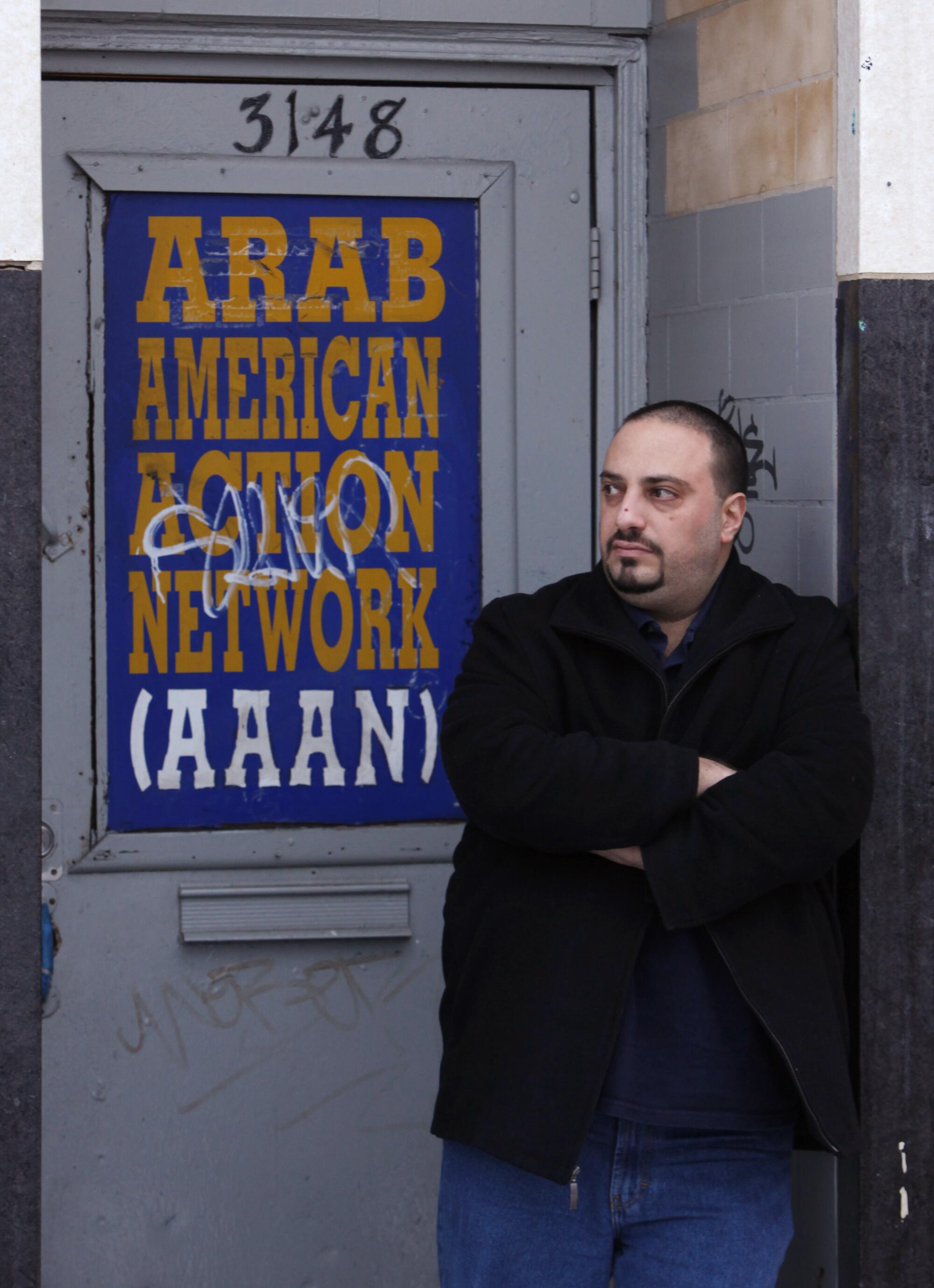
“I saw that social change wasn’t going to happen at UCLA,” he said, noting that that was no longer the case, given the university’s pro-Palestinian protests in recent months. He left campus and returned to Chicago, where he coached high school basketball and was increasingly drawn to civil rights issues and working with the Palestinian community. In 2002, he traveled to Jerusalem, Gaza and the West Bank as part of a program to teach young Arab and Palestinian Americans and others about the Israeli occupation so they could return to the U.S. to help organize for Palestinian independence.
“I came back from that trip transformed,” he said. “I think for a while I had felt diaspora guilt. I realized I had to commit more of my life to ending the occupation. I owed it to my parents and my grandparents and cousins of mine who did not have the opportunity I had to grow up in safety and security. They faced bullets and repression.”
The morning after his drive to the Arab neighborhood, Abudayyeh parked near Union Park and walked toward the United Center in west Chicago. He approached from a side street, wondering how close he could get during the convention. He talked logistics and spoke of the St. Paul Principles for protest — put together by activists at the 2008 Republican convention — that call for solidarity and opposing “any state repression of dissent including surveillance, infiltration, disruption and violence.”
The parking lots were empty. A local film crew was shooting video. “I know the camera guys,” he said. “The reporters don’t always come to our protests. But the photo guys do. They know me.” He turned and walked back toward Union Park. He mentioned that his father never finished college; he had children and relatives back in Al Jib to support. It was that way for many, he said, turning past First Baptist Church, his jeans frayed and cuffed, his T-shirt blowing in a hot breeze.
Marchers, he said, would be arriving from across the country in buses, trains and caravans. He predicted they would fill the park and swell into the streets. There were only weeks left to prepare. The sun was high and he was sweating. He pulled down his COVID mask and took a breath, disappearing into the shadows at the edge of the park and driving home for a few hours’ rest.
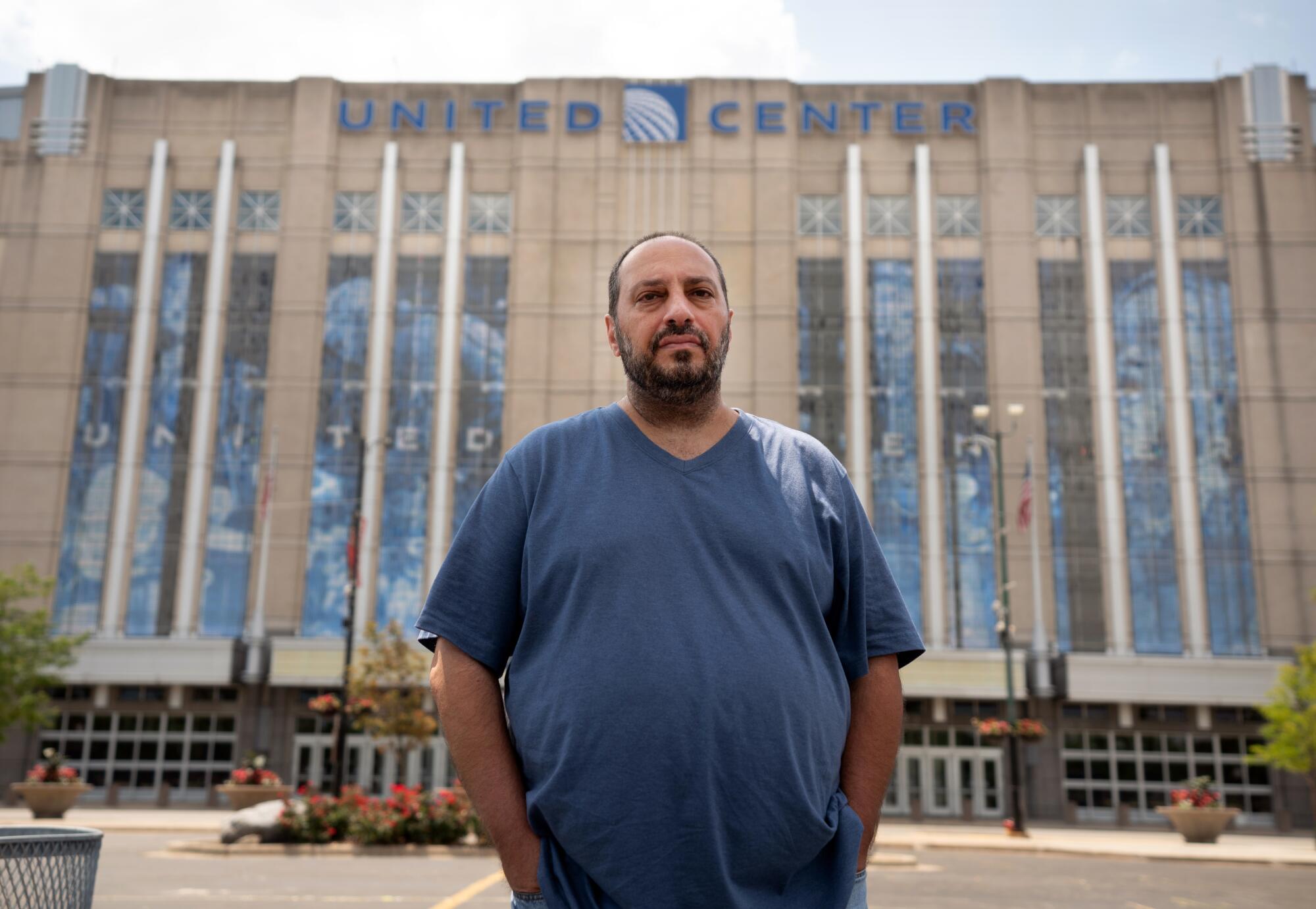
More to Read
Get the L.A. Times Politics newsletter
Deeply reported insights into legislation, politics and policy from Sacramento, Washington and beyond. In your inbox twice per week.
You may occasionally receive promotional content from the Los Angeles Times.
